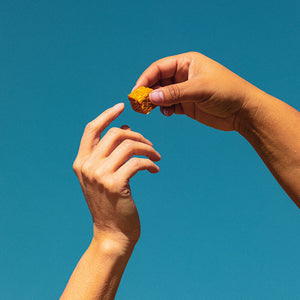There are superfoods, and then there are superfoods. Chia seeds are so nutritionally complete that they certainly qualify as the latter. While it might seem impossible that these tiny black seeds could provide virtually everything you need to subsist in a day, don’t let the size of chia seeds fool you. Within those tiny grains are a nutritional punch so powerful that you won’t believe what hit you. Although chia seeds are just now having their moment in the modern spotlight, they’ve been an important food to cultures for several millennia. The word “chia” is derived from the ancient Mayan word for “strength,” and chia seeds were a staple of the Aztec and Mayan diets because of the sustainable energy they provide. There are many incredible health benefits of ground chia seeds.
By the Numbers:
4-5: Number of years chia seeds can last without refrigeration (1).
10: Grams of fiber in one ounce of chia seeds (2).
9: Chia seeds can absorb up to 9 times their weight in liquid, which is why they make such great pudding! (3)
Benefits
Nutrition
Chia seeds are one of the best sources of important nutrients when compared to other foods calorie for calorie. A one-ounce serving of chia seeds contains 10 grams of fiber, 4 grams of protein, and 9 grams of fat, 5 of which are healthy omega-3 fatty acids (2). You’ll also receive 18 percent of your recommended daily intake of calcium, 30 percent of recommended manganese and magnesium intake, and 27 percent of the recommended daily intake of phosphorus, plus plenty of zinc, potassium, and vitamins B1, B2, and B3. You’ll receive all of those nutrients for just 137 calories per ounce, too.
Fiber
Did you know that most people consume less than half of the recommended fiber intake for their age and gender? Fiber is an important nutritional component that helps regulate our bowel movements and flush cholesterol and carcinogens out of the body (4). It also helps slow the rate that sugar is absorbed into the bloodstream, helping to keep your blood sugar levels steady. Chia seeds are an excellent source of fiber, with 10 grams of fiber in just one ounce or 5 grams per tablespoon. If you’re looking for weight loss, fiber is even more important, as foods that are high in fiber help you feel fuller for longer.
Blood Sugar
The American Diabetes Association states that 32.6 million Americans suffered from type 2 diabetes in 2018, with more than 20 percent of cases undiagnosed (5). People with untreated type 2 diabetes, including those who are unaware of their condition or those who are not currently receiving treatment, often have high fasting blood sugar levels, which can cause serious health consequences. People with consistently high fasting blood sugar levels are more likely to suffer from chronic diseases like heart disease, and temporary blood sugar spikes, such as after eating a meal, can also cause adverse health effects. Studies have found that eating bread containing chia seeds helps lower the rise in blood sugar that typically occurs after a meal as compared to eating bread that does not contain chia seeds (6). Animal studies are even more promising, demonstrating that chia seeds may help improve blood sugar control, stabilize blood sugar levels after meals, and improve insulin sensitivity (7).
Brain Health
All of the omega-3 fatty acids in chia seeds means that you’re boosting your brain health every time you eat them. Omega-3 fatty acids are essential for brain function; docosahexaenoic acid, better known as DHA, is especially important in maintaining our brain function. Chia seeds are high in an omega-3 fatty acid called alpha-linolenic acid, which can be converted into the active form of DHA. Taking DHA daily has been shown to improve memory and performance on computerized cognitive tests (8). Chia seeds actually contain more omega-3 fatty acids than salmon when compared gram for gram!
Bone Health
Chia seeds are packed with nutrients that promote bone health, including calcium, phosphorus, magnesium, and protein. Eating an ounce of chia seeds provides 18 percent of the daily recommended intake of calcium, which makes ground chia seeds an excellent calcium source for vegans and other people who do not consume dairy products. Regardless of whether you eat dairy or not, it might be worth adding chia seeds to your dietary rotation; gram for gram, chia seeds are higher in calcium than most dairy products.
Chronic Inflammation
Our bodies naturally respond to infection or injury with inflammation, which helps us to fight off bacteria and other possible causes of infection. When inflammation occurs in response to an acute threat, it can be helpful, but some people suffer from chronic inflammation. Chronic inflammation is demonstrated by inflammatory markers in the blood and is associated with an increased risk of heart disease or cancer, and it is commonly associated with unhealthy lifestyle choices. People who smoke, do not get the recommended daily amount of exercise, or eat an unhealthy diet are considered at higher risk of chronic inflammation. Chia seeds can help reduce chronic inflammation and lower the levels of inflammatory markers in the blood by as much as 40 percent (9).
Diverticulosis and diverticulitis
Diverticulitis, a condition in which the pouches begin to protrude from the walls of the colon, becoming infected and inflamed, and diverticulosis, which sees the protrusion of pouches without infection, are thought to affect up to 50 percent of people by the time they are 50 years old (10). High fiber diets are often recommended for patients suffering from a diverticulitis flare up, as the fiber helps to absorb water in the colon, producing easier bowel movements. Many people who experience diverticulosis or diverticulitis eat a low fiber diet, and chia seeds are a simple way to add more fiber to your daily diet. Simply throw them into a smoothie or get a dose of them in your daily GEM vitamin.
Heart Health
All those omega-3 fatty acids in chia seeds aren’t just good for your brain - they also promote heart health, too. Omega-3 fatty acids have been shown to reduce the risk of dangerous blood clots, called deep vein thrombosis, and arrhythmias, both of which can cause heart attack or stroke. It’s also believed that omega-3 fatty acids help reduce levels of total cholesterol, LDL cholesterol, and triglycerides, as well as helping to reduce plaque in the arteries. You can find omega-3 fatty acids in - you guessed it - chia seeds! An increased fiber intake of as little as 10 grams per day has also been shown to improve heart health by lowering blood pressure and cholesterol (11).
How to Eat Chia Seeds
One of the easiest ways to add more chia seeds into your daily diet is taking your daily GEM, of course. GEM contains organic chia seeds that provide all of the health benefits we’ve just mentioned, but you might be looking to add even more chia seeds to your diet. As chia seeds have come into the mainstream as far as nutrition is concerned, there are no shortage of recipes that can help you add an ounce or two to your daily diet.
- Add them in: Chia seeds are tiny, which means you’ll barely notice adding them into many recipes. Consider adding them into your bread dough, brownie mix, or muffin or pancake batter. We bet you won’t even notice they’re there!
- Blend them up: Smoothies are a great place to use chia seeds. They are so small that they won’t get stuck in your teeth, and you won’t notice that they’re there. Add them to your green smoothie tomorrow morning.
- Top it off: Dry chia seeds can be added to your morning yogurt or lunchtime salad for a little extra crunch. Try using it in the morning instead of granola and you’ll be surprised at how much energy you have (and without the added sugar to boot!).
- Make a pudding: Chia seeds can be made into a gel by soaking them with liquids like water, juice, non-dairy milk, and other liquids, if you prefer to take them in in a liquid form. They make a great addition to pudding, including delicious recipes like this one that satisfy your sweet tooth and get you a ton of vitamins and minerals at the same time. Try making a chia pudding and eating it in place of a sugary cereal.
One of the best things about chia seeds is that they meet the dietary requirements for people following any number of diets, including gluten-free, paleo, vegan, vegetarian, and raw diets. That means their incredible nutritional powers are available to nearly everyone, no matter what type of dietary restrictions you may have. So, what’s stopping you from adding chia seeds to your daily routine?
Myth Busters:
- It’s true - the beloved “Chia Pets” of the 1980s and 1990s were made from the same chia seeds that we’re now using in our smoothies! Who knew they were so delicious, nutritious, and fun?
- There’s no nutritional difference between black and white chia seeds.
Sources:
1. https://www.hsph.harvard.edu/nutritionsource/food-features/chia-seeds/
2. https://www.healthline.com/nutrition/11-proven-health-benefits-of-chia-seeds
3. https://www.healthline.com/nutrition/35-ways-eat-chia-seeds
4. https://www.medicalnewstoday.com/articles/291334#benefits
5. https://www.diabetes.org/resources/statistics/statistics-about-diabetes
6. https://pubmed.ncbi.nlm.nih.gov/20087375/
7. https://pubmed.ncbi.nlm.nih.gov/18492301/
8. https://ods.od.nih.gov/factsheets/Omega3FattyAcids-HealthProfessional/
9. https://pubmed.ncbi.nlm.nih.gov/17686832/
10. https://www.medicalnewstoday.com/articles/152995
11. https://academic.oup.com/ajcn/article/69/1/30/4694117
12. https://www.verywellfit.com/peanut-butter-cup-chia-pudding-4142918






